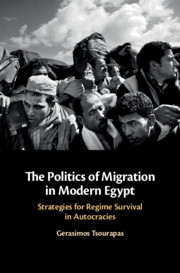Book contents
- Reviews
- The Politics of Migration in Modern Egypt
- The Politics of Migration in Modern Egypt
- Copyright page
- Dedication
- Epigraph
- Contents
- Figures
- Tables
- Acknowledgements
- Chronology of Key Events
- 1 Introduction
- 2 ‘Egyptians Don’t Emigrate’
- 3 Exporting the Free Officers’ Revolution
- 4 ‘Our Most Precious Asset’
- 5 ‘The Rich Hive Invaded by Foreign Bees’
- 6 Egypt’s Road to Revolution
- 7 Conclusion
- Notes
- Appendix Primary Sources Index
- Bibliography
- Index
2 - ‘Egyptians Don’t Emigrate’
The Domestic Politics of Migration Restriction
Published online by Cambridge University Press: 17 December 2018
- Reviews
- The Politics of Migration in Modern Egypt
- The Politics of Migration in Modern Egypt
- Copyright page
- Dedication
- Epigraph
- Contents
- Figures
- Tables
- Acknowledgements
- Chronology of Key Events
- 1 Introduction
- 2 ‘Egyptians Don’t Emigrate’
- 3 Exporting the Free Officers’ Revolution
- 4 ‘Our Most Precious Asset’
- 5 ‘The Rich Hive Invaded by Foreign Bees’
- 6 Egypt’s Road to Revolution
- 7 Conclusion
- Notes
- Appendix Primary Sources Index
- Bibliography
- Index
Summary
- Type
- Chapter
- Information
- The Politics of Migration in Modern EgyptStrategies for Regime Survival in Autocracies, pp. 32 - 58Publisher: Cambridge University PressPrint publication year: 2018



